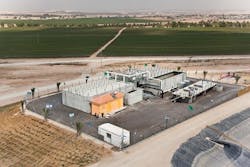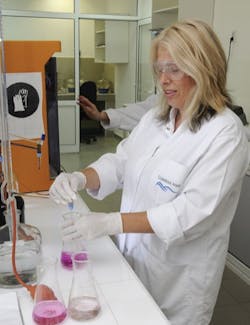As part of the Eastern Europe focus, Water & Wastewater International (WWi) quizzes Mariana Iteva, country director for Bulgaria, Veolia Water, over the country's high level water losses, technology trends and role of the private sector.
World Bank estimates suggest €7 billion is needed to reconstruct and develop water and wastewater infrastructure in Bulgaria. How is the country's state budget going to cope with this?
Mariana Iteva (MI): Bulgarian municipalities are facing important investment needs in water and wastewater infrastructure. EU funding remains essential but its absorption takes more time and effort than anticipated. Moreover, the investment needs of the Bulgarian water sector are very high and EU funding alone will not be sufficient to cover them. Public-private partnerships (PPP) and EU funding are complimentary and can co-exist on the same projects. The models used for projects benefiting from both EU Funds and private funds through PPP show clearly who is investing, how much will be invested, so that the tariff is taking into account only the investment share that is not financed by EU funds. The final beneficiary is in fact the end consumer not having included the investment share financed by EU in his bill.
WWi: Veolia Water acquired a majority share in Sofiyska Voda last year. Can you tell us more about how the operational services and challenges are going in Sofia?
MI: Following a detailed review and analysis of Sofiyska Voda's activities, Veolia Water identified certain aspects of its work which have to be further improved as a priority in order to meet the group's world standards and our customers' expectations.
Of course, the most important priority is the customer services improvement, including raising customer awareness. Another priority is reduction of non-revenue water by continuous optimisation of the revenue water meters, detection of illegal connections and improved debt collection.
Sofiyska Voda is already benefiting from Veolia Water's expertise and best practices in order to optimise the work of its two potable water treatment plants and a wastewater treatment plant.
WWi: How is Veolia Water, as a private operator, progressing elsewhere in a country dominated by the public sector?
MI: Bulgaria is a strategic market for Veolia Water, which we have been following for more than 10 years. Our current priority is the pilot project for public-private partnership in the Bulgarian water and wastewater sector, initiated by the Ministry of Regional Development and Public Works with the support of the International Finance Corporation about four years ago.
WWi: What type of Public-Private-Partnership do you think will be the best fit for Bulgaria?
MI: The benefits of public-private partnerships vary from case to case. Our track record shows that such partnerships usually lead to increased efficiency of the water and wastewater companies, improved customer service and introduction of new technologies and more investments. Concession and lease contracts are the two most popular forms which exist in Europe at the moment and in our opinion could be successfully applied in Bulgaria as well.
It should be stressed that the choice of specific form of PPP model depends very much on the local conditions of each municipality or region. Here the importance of the last "P" – partnership should be emphasised.
This means that the public and the private partner should share the risks as well as the responsibility about strategic decisions. The public sector usually retains control over asset ownership as well as tariff setting. It is important to stress that deciding upon tariffs is always a public task. The private sector focuses on increasing the efficiency and improving customer services.
WWi: Water losses remain a major problem in the country, varying from 40% to 79% of supply. What is being done to improve this figure?
MI: Non-revenue water includes both physical and commercial losses. In order to reduce physical water losses in Sofia, we implement engineering solutions which have proven their effectiveness throughout the world. We strive to optimise and improve the management of the distribution network through zoning and network analysis, testing, pressure management, reduction of response time incases of visible leaks and detecting hidden leaks with specialised equipment. Our forecast is that water losses will decrease by up to 40% in certain areas as a result of the above measures.
On the other hand, reduction of commercial losses requires both engineering and administrative actions. We are trying to get a full understanding of our customers' consumption trends. This includes carrying out a number of activities to identify illegal or unclear consumption along the network.
Unfortunately, what is needed here is not only effective solutions by the respective water and wastewater operator. The problem is related to the regulatory basis of the country as well as to customers' consumption culture. In 2010, the level of non-revenue water has decreased by over 6 million m3. This shows that our actions have brought results.
This year we will strive to achieve an ever greater "saving" of this precious natural resource. We have every reason to believe that this will happen. Moreover, now that Sofiyska Voda has joined the big family of Veolia Water, we have the opportunity to exchange experience with leading specialists from the Czech Republic, Romania, Hungary, France and other countries where Veolia Water operates.
WWi: How is the country progressing with introducing and increasing tariffs, given the infrastructure's lack of ability to switch off supplies if customers do not pay bills? What rate does Veolia Water expect for water?
MI: Water is a local issue. In Europe, it is common practice that local authorities decide upon tariffs, like in Bulgaria. As I stressed before, deciding upon tariffs is always a public task. Veolia Water does not decide what the consumers are to pay, but we commit to efficient operations, thus minimising the component of the city's tariff that relates to operations.
The frequency at which tariffs change is a local issue. Generally I can say that in many cases a tariff increase comes in the wake of a major investment, like for instance a protective measure of the environment through the construction of a wastewater treatment plant.
Due to all the parameters influencing tariffs, it does not always make sense to compare tariffs between different countries. Criteria of affordability need to be defined locally.
Veolia Water trusts the management of each of its subsidiaries to apply the most adapted method for collecting bills with respect to the legislation of each country and within the local economic and social context. For example, in Prague and in Bucharest where Veolia Water operates, billing is done at block level while in Bulgaria the individual apartments are invoiced. It is interesting to know that in Romania there is a superstition that if you do not pay all your outstanding bills before the end of year you will have bad luck in the New Year. Our other subsidiaries can also learn from Sofiyska Voda's experience of collecting unpaid bills.
WWi: Can you tell us more about some of the technology trends you are seeing for water and wastewater treatment in the country?
Mi: Both Veolia Water and Sofiyska Voda work in line with the UN's green strategy. In December 2009, Sofiyska Voda commissioned the largest cogeneration installation in the Bulgarian water sector for combined heat and power production from biogas.
For this purpose, Sofiyska Voda implemented a 2.56 million euro investment project for rehabilitation and renewal of the sludge and gas facilities so that biogas can be captured. The capacity of each of the three cogenerators is 1063 kW of power or 1088 kW of heat, which is sufficient to meet the needs of a small Bulgarian village. Sofiyska Voda can also benefit from Veolia Water's experience in Budapest where 90-100% of the power needs of the two main wastewater treatment plants of the Hungarian capital are provided from green energy, which is sufficient to meet the needs of a small town of 15 000 inhabitants.
The next step we would like to discuss together with the Municipality of Sofia is to further expand the activity of Kubratovo WWTP and introduce joint processing of organic waste from the food industry and sludge, which will lead to increased production of biogas for generation of green electricity. The implementation of this project would contribute to Sofia's green future and to preservation of natural resources.
WWi: Finally, if you had to predict the status of Bulgaria's water industry in ten years time, what would you say?
MI: The Water Act was amended in June 2009 to settle the issue of asset ownership. We understand that the relevant Bulgarian authorities are considering further amendments to it in the near future.
Executive ProfileMariana Iteva, Country director for Bulgaria, Veolia WaterPrior to joining Veolia Water, Iteva worked as a representative for Bulgaria and Eastern Europe for the UK water company, Cascal, as well as for another British water company, Severn Trent. Between 2003 and 2006 she was the head of Severn Trent's representative Office in Moscow. In 2009 she was seconded for three months to the UK Trade and Investment Section of the British Embassy in Moscow to research and investigate commercial opportunities for British companies in the Russian water sector. Mariana has a Master of Arts degree from Sofia University as well as a Master of Business Administration with a specialisation in International Business Development from Aston University in Birmingham, UK. |
Obviously, any law could be improved but we would like to confirm our readiness to start working on a PPP project in the Bulgarian water sector within the existing legal framework. This, in our opinion is sufficient to organise and hold a transparent tender in line with EU requirements.
We believe that in the future the Bulgarian water sector should consolidate further and have less water and wastewater operators serving more people. Bulgaria consists of 28 districts/regions and drinking water and sewerage services are provided by 51 water and wastewater operators. As the country's population is 7.5 million inhabitants, the average number of people served by one operator is approximately 147,000. As a comparison, in Slovakia, 17 water and wastewater companies serve 5.4 million people (i.e. 300,000 people served by one operator as average).
In order to become attractive to international investors and for the implementation of PPP projects the size for a Regional Water and Wastewater Association territory, for example, should cover at least 250,000 inhabitants.
We also believe that technological knowledge, expertise and best practices from the private sector should be used in order to improve the services to customers by implementing PPP projects in the near future.
Author's note:Mariana Iteva is the country director for Bulgaria, Veolia Water, based in Sofia.
More Water & WasteWater International Current Issue Articles
More Water & WasteWater International Archives Issue Articles






